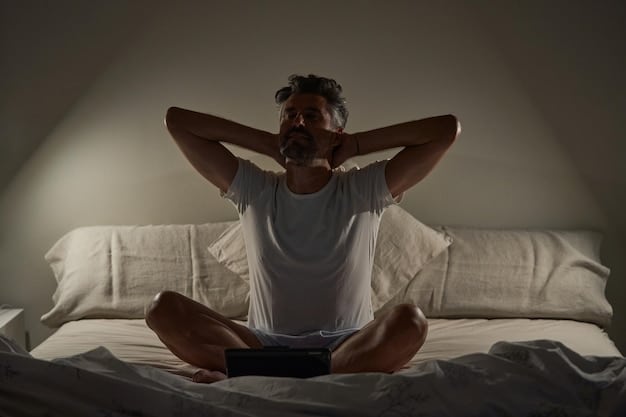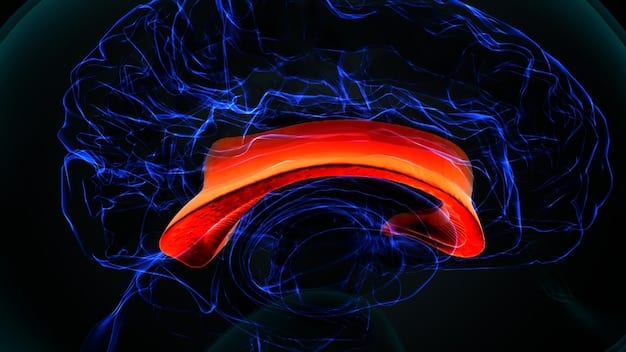Can Stress Cause Erectile Dysfunction? Anxiety Management Strategies

Stress can indeed contribute to erectile dysfunction (ED) by affecting hormones, blood flow, and nerve function; fortunately, strategies like therapy, lifestyle changes, and medication can help manage anxiety and improve sexual health.
Can stress really cause erectile dysfunction? It’s a question many men ponder, often in silence. Can stress really cause erectile dysfunction? Proven strategies for managing anxiety aims to shed light on this sensitive topic, offering insights and practical solutions to help regain control.
Understanding the Link Between Stress and Erectile Dysfunction
Erectile dysfunction (ED) is a common issue characterized by the inability to achieve or maintain an erection firm enough for satisfactory sexual intercourse. While physical factors often take center stage, the psychological impact of stress cannot be underestimated.
Let’s explore the intricate relationship between stress and ED.
The Physiological Impact of Stress
When you experience stress, your body activates the “fight or flight” response. This involves the release of hormones like cortisol and adrenaline, which can have a direct impact on your sexual function.
Chronic stress can disrupt these normal physiological processes. Here’s how:
- Hormonal Imbalance: Elevated cortisol levels can interfere with testosterone production, a crucial hormone for male sexual health.
- Reduced Blood Flow: Stress can constrict blood vessels, making it harder for blood to flow to the penis, essential for achieving an erection.
- Nerve Function: Stress can affect the nervous system, disrupting the signals that trigger an erection.
Therefore, understanding these connections establishes the foundation for addressing the interaction of stress and ED.

Identifying the Types of Stress That Contribute to ED
Not all stress is created equal. Different types of stress can have varying impacts on your sexual health. Identifying these is key to managing and mitigating their effects.
Let’s delve into the specific types of stress that are commonly linked to ED.
Occupational Stress
The pressures of work, deadlines, and job security can create significant stress. This type of chronic stress can lead to hormonal imbalances and decreased libido.
Relationship Stress
Conflicts, communication issues, and lack of intimacy can negatively impact sexual desire and performance. Addressing these issues is vital for improving both your relationship and your sexual health.
Financial Stress
Worries about money, debt, and financial stability can create high levels of anxiety. This anxiety can directly interfere with your ability to relax and enjoy sexual activity.
Here are some other stressors to consider:
- Health Concerns: Worries about your own health or the health of loved ones can significantly increase stress levels.
- Social Isolation: Feeling disconnected from others can lead to depression and anxiety, both of which can contribute to ED.
- Life Transitions: Major life changes such as moving, changing jobs, or experiencing loss can be highly stressful.
By pinpointing the stressors in your life, you can start to develop strategies to manage them more effectively. This awareness is the first step towards a healthier sexual life.
Proven Strategies for Managing Anxiety and Reducing ED
Now that we’ve established the connection between stress and erectile dysfunction, let’s explore some effective strategies for managing anxiety and improving sexual health. These methods are designed to help you regain control and confidence.
Here are techniques to help manage stress and potentially reduce ED:
Lifestyle Changes: Exercise and Diet
Regular physical activity and a balanced diet can have a profound impact on both your physical and mental health. Exercise helps release endorphins, which have mood-boosting effects. A healthy diet provides the necessary nutrients for optimal bodily function.
Mindfulness and Meditation Techniques
Practicing mindfulness and meditation can help reduce stress and improve focus. Techniques such as deep breathing, guided imagery, and mindfulness meditation can calm the mind and promote relaxation.
Therapy and Counseling Options
Seeking professional help from a therapist or counselor can provide you with valuable tools and support for managing anxiety. Cognitive-behavioral therapy (CBT) and other therapeutic approaches can help you identify and change negative thought patterns and behaviors.
Consider these additional strategies:
- Prioritize Sleep: Aim for 7-9 hours of quality sleep each night to help your body and mind recover.
- Limit Alcohol and Caffeine: Both can exacerbate anxiety and interfere with sleep.
- Connect with Others: Spend time with supportive friends and family to reduce feelings of isolation.
- Engage in Hobbies: Pursue activities you enjoy to reduce stress and improve your overall well-being.
The Role of Medication in Addressing Stress-Related ED
While lifestyle changes and therapy are crucial, medication can also play a role in managing stress-related erectile dysfunction. It’s important to consult with a healthcare professional to determine the best course of action for your specific needs.
Medications can help address both the anxiety and the ED itself.
Anti-Anxiety Medications
Selective serotonin reuptake inhibitors (SSRIs) and other anti-anxiety medications can help reduce the symptoms of anxiety and improve your overall mood. These medications can take several weeks to become fully effective, so patience is key.
ED Medications
Phosphodiesterase-5 (PDE5) inhibitors, such as sildenafil (Viagra), tadalafil (Cialis), and vardenafil (Levitra), can help improve blood flow to the penis and facilitate erections. These medications are typically taken before sexual activity.
Combining Medication with Other Therapies
Using medication in conjunction with lifestyle changes and therapy can often yield the best results. A holistic approach addresses both the physical and psychological aspects of stress-related ED.

Building a Supportive Environment for Sexual Wellness
Creating a supportive environment is essential for managing stress and promoting sexual wellness. This involves open communication, setting realistic expectations, and fostering a positive mindset.
Here are some key elements to consider:
Open Communication with Your Partner
Talking openly and honestly with your partner about your concerns, anxieties, and needs is crucial. This can help reduce pressure and create a more relaxed and intimate atmosphere. Additionally, discussing ED openly can reduce stigma and promote understanding.
Setting Realistic Expectations
Avoid placing too much pressure on yourself to perform. Set realistic expectations for your sexual encounters and focus on enjoying the experience rather than achieving a specific outcome. Remember, sex is about connection and pleasure, not just performance.
Positive Mindset and Self-Care
Cultivating a positive mindset and practicing self-care can significantly reduce stress and improve your overall well-being. Engage in activities that bring you joy and relaxation, and prioritize your mental and physical health.
Here are additional tips for fostering a supportive environment:
- Create a Relaxing Atmosphere: Set the mood with soft lighting, music, and candles to reduce anxiety.
- Experiment and Explore: Try new things and explore different forms of intimacy to keep your sex life exciting and reduce pressure.
- Seek Support: Join a support group or online forum to connect with others who are experiencing similar challenges.
When to Seek Professional Help for Stress-Related ED
Recognizing when to seek professional help is crucial for addressing stress-related erectile dysfunction effectively. If lifestyle changes and self-help strategies are not providing relief, it may be time to consult with a healthcare professional.
Here are some signs that it’s time to seek help:
- Persistent ED: If you’re experiencing ED on a regular basis for several months.
- Significant Anxiety: If your anxiety is interfering with your daily life.
- Relationship Issues: If ED is causing significant strain in your relationship.
Remember, seeking professional help is a sign of strength, not weakness. A healthcare provider can help you identify the underlying causes of your ED and develop a personalized treatment plan. They may recommend medication, therapy, or a combination of both. It’s also valuable to learn to ask the right questions of your doctor to ensure you receive the best treatment.
Don’t hesitate to reach out for support. Taking the first step can be life-changing.
| Key Point | Brief Description |
|---|---|
| 💪 Exercise & Diet | Regular exercise and a balanced diet improve overall health & reduce stress. |
| 🧘 Mindfulness | Meditation and mindfulness techniques can calm the mind and reduce anxiety. |
| 🗣️ Communication | Open communication with your partner reduces pressure and enhances intimacy. |
| 💊 Medication | Medications like SSRIs and PDE5 inhibitors can help manage anxiety and improve erectile function. |
Frequently Asked Questions
▼
Yes, stress can directly contribute to ED by affecting hormones, blood flow, and nerve function. Chronic stress can disrupt these normal physiological processes, leading to difficulties in achieving or maintaining an erection.
▼
Occupational stress, relationship stress, and financial stress are common culprits. These types of stress can lead to hormonal imbalances, decreased libido, and anxiety, all of which can contribute to ED.
▼
Regular exercise and a balanced diet can improve overall health and reduce stress. Exercise releases endorphins, which have mood-boosting effects, while a healthy diet provides the necessary nutrients for optimal bodily function.
▼
If lifestyle changes and self-help strategies are not providing relief, consider consulting with a healthcare professional. They may recommend anti-anxiety medications or ED medications to help manage your symptoms.
▼
Open communication is crucial for managing ED. Talking openly and honestly with your partner about your concerns and needs can reduce pressure and create a more relaxed and intimate atmosphere, fostering a supportive environment.
Conclusion
In conclusion, stress can indeed play a significant role in erectile dysfunction, but it’s a manageable condition. By understanding the link between stress and ED, implementing effective anxiety management strategies, and seeking professional help when needed, you can regain control and improve your sexual wellness. Remember, you’re not alone, and there are resources and solutions available to help you on your journey.





